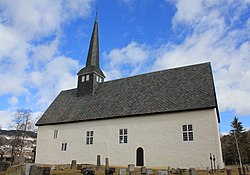Top Qs
Timeline
Chat
Perspective
Østre Gausdal Municipality
Former municipality in Oppland, Norway From Wikipedia, the free encyclopedia
Remove ads
Østre Gausdal is a former municipality in the old Oppland county, Norway. The 227-square-kilometre (88 sq mi)[6] municipality existed from 1879 until its dissolution in 1962. The area is now part of Gausdal Municipality in the traditional district of Gudbrandsdal. The administrative centre was the village of Segalstad bru.[7]
Prior to its dissolution in 1962, the 226.9-square-kilometre (87.6 sq mi) municipality was the 352nd largest by area out of the 731 municipalities in Norway. Østre Gausdal Municipality was the 214th most populous municipality in Norway with a population of about 3,977. The municipality's population density was 17.5 inhabitants per square kilometre (45/sq mi) and its population had increased by 1.2% over the previous 10-year period.[8][9]
The main church for the municipality was Østre Gausdal Church, a brick, Romanesque church built during the period 1250–1300. The church was renovated and enlarged in the 1700s.
Remove ads
General information
Summarize
Perspective
In 1879, the large Gausdal Municipality was divided into two separate municipalities: Vestre Gausdal Municipality (population: 2,362) and Østre Gausdal Municipality (population: 5,911). Vestre Gausdal Municipality included the larger, more rural parts of the old municipality and Østre Gausdal Municipality was much smaller and more densely populated and it was located in the southwestern part of the old municipality. The border between the two municipalities was the river Jøra.[10]
During the 1960s, there were many municipal mergers across Norway due to the work of the Schei Committee. On 1 January 1962, Vestre Gausdal Municipality (population: 2,590) and Østre Gausdal Municipality (population: 3,942) were reunited as Gausdal Municipality once again (with almost the same boundaries as the old Gausdal Municipality).[10]
Name
When the large Gausdal Municipality was divided into two new municipalities in 1879, the eastern part was given the prefix østre which means "eastern". The municipality is named after the Gausdalen valley (Old Norse: Gausdalr) since the municipality is located in the valley. The first element is named after the river Gausa which flows through the valley. The river name comes from the verb gjósa which means to "gush", "burst out", or "stream forcefully". The last element is dalr which means "valley" or "dale".[11]
Churches
The Church of Norway had two parishes (sokn) within Østre Gausdal Municipality. At the time of the municipal dissolution, it was part of the Østre Gausdal prestegjeld and the Sør-Gudbrandsdal prosti (deanery) in the Diocese of Hamar.[9]
Remove ads
Geography
The municipality was located in the Gausdalen valley and east of the Jøra river. Sør-Fron Municipality was to the northwest, Ringebu Municipality was to the north, Øyer Municipality was to the east, Fåberg Municipality was to the south, and Vestre Gausdal Municipality was to the west. The highest point in the municipality was the 1,446-metre (4,744 ft) tall mountain Storhøa, on the border with Sør-Fron Municipality.[1]
Remove ads
Government
Summarize
Perspective
While it existed, Østre Gausdal Municipality was responsible for primary education (through 10th grade), outpatient health services, senior citizen services, welfare and other social services, zoning, economic development, and municipal roads and utilities. The municipality was governed by a municipal council of directly elected representatives. The mayor was indirectly elected by a vote of the municipal council.[12] The municipality was under the jurisdiction of the Eidsivating Court of Appeal.
Municipal council
The municipal council (Herredsstyre) of Østre Gausdal Municipality was made up of representatives that were elected to four year terms. The tables below show the historical composition of the council by political party.
Mayors
The mayor (Norwegian: ordfører) of Østre Gausdal Municipality was the political leader of the municipality and the chairperson of the municipal council. The following people have held this position:
- 1879–1879: John Svendsen Waalen[19]
- 1879–1883: Christian Gundersen Fougner[20]
- 1884–1888: Even Hage[21]
- 1888–1891: Erik Enge (V)
- 1891–1895: Simen Wold[22]
- 1896–1901: Erik Enge (V)[23]
- 1902–1911: Sjur Fedje (ArbDem)[24]
- 1912–1913: Johan Ferdinand Bøhmer[25]
- 1913–1919: Kristian Lien (ArbDem)[26][27]
- 1919–1940: Ivar Bjørge (ArbDem/RF)[28]
- 1941–1945: Simen Thallaug (NS)[29]
- 1945–1945: Ivar Bjørge (RF)
- 1946–1961: Reidar Engjom (Ap)
Remove ads
See also
References
Wikiwand - on
Seamless Wikipedia browsing. On steroids.
Remove ads



